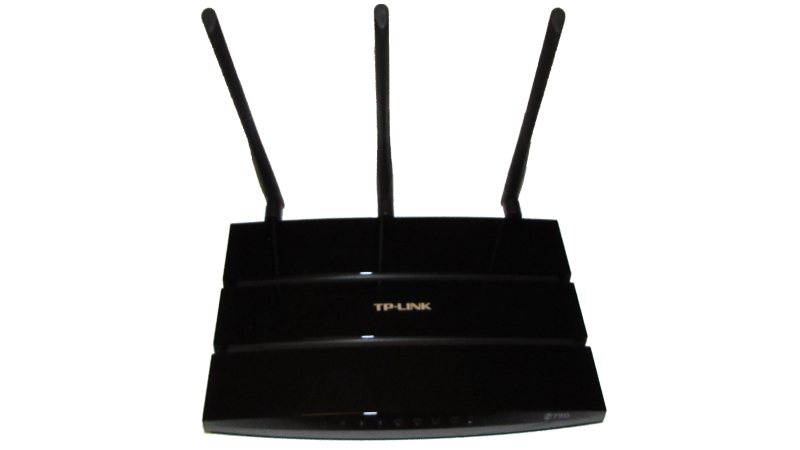
Instalación de la distribución de Linux OpenWrt en un router inalámbrico de banda dual simultáneo TP-Link WDR4300.
Modelo: TP-Link WDR4300
Versión de OpenWrt: openwrt-ar71xx-generic-tl-wdr4300-v1-squashfs-factory.bin
Establecer una conexión con cable al puerto LAN 1 del router WDR4300. En una consola ver que dirección IP ha sido adquirida. En este ejemplo se ha conectado una máquina Linux Debian al router WDR4300.
ifconfig
eth0 Link encap:Ethernet HWaddr 00:11:22:33:44:55 inet addr:192.168.0.100 Bcast:192.168.0.255 Mask:255.255.255.0 UP BROADCAST RUNNING MULTICAST MTU:1500 Metric:1 RX packets:10879 errors:0 dropped:0 overruns:0 frame:0 TX packets:6442 errors:0 dropped:0 overruns:0 carrier:3 collisions:0 txqueuelen:1000 RX bytes:15543710 (15.5 MB) TX bytes:559758 (559.7 KB)
Abrir un navegador e iniciar una sesión en el router WDR4300 usando admin como nombre de usuario y contraseña.
Instalar el firmware de OpenWrt como se muestra en las siguientes imágenes.
Después de reiniciar, el router estará en otro segmento de la red.
ifconfig
eth0 Link encap:Ethernet HWaddr 00:11:22:33:44:55 inet addr:192.168.1.222 Bcast:192.168.1.255 Mask:255.255.255.0 UP BROADCAST RUNNING MULTICAST MTU:1500 Metric:1 RX packets:16221 errors:0 dropped:0 overruns:0 frame:0 TX packets:13978 errors:0 dropped:0 overruns:0 carrier:7 collisions:0 txqueuelen:1000 RX bytes:16852043 (16.8 MB) TX bytes:9248200 (9.2 MB)
Conectarse vía Telnet al router WDR4300.
telnet 192.168.1.1
Trying 192.168.1.1...
Connected to 192.168.1.1.
Escape character is '^]'.
=== IMPORTANT ============================
Use 'passwd' to set your login password
this will disable telnet and enable SSH
------------------------------------------
BusyBox v1.19.4 (2014-01-27 08:51:57 MST) built-in shell (ash)
Enter 'help' for a list of built-in commands.
_______ ________ __
| |.-----.-----.-----.| | | |.----.| |_
| - || _ | -__| || | | || _|| _|
|_______|| __|_____|__|__||________||__| |____|
|__| W I R E L E S S F R E E D O M
-----------------------------------------------------
BARRIER BREAKER (Bleeding Edge, r39404)
-----------------------------------------------------
* 1/2 oz Galliano Pour all ingredients into
* 4 oz cold Coffee an irish coffee mug filled
* 1 1/2 oz Dark Rum with crushed ice. Stir.
* 2 tsp. Creme de Cacao
-----------------------------------------------------
Cambiar la contraseña del dispositivo.
passwd
Changing password for root New password: **************** Retype password: **************** Password for root changed by root
exit
Connectarse vía SSH al dispositivo WDR4300.
ssh 192.168.1.1
The authenticity of host '192.168.1.1 (192.168.1.1)' can't be established.
RSA key fingerprint is 99:88:77:66:55:44:33:22:11:00:AA:BB:CC:DD:EE:FF.
Are you sure you want to continue connecting (yes/no)? yes
Warning: Permanently added '192.168.1.1' (RSA) to the list of known hosts.
root@192.168.1.1's password:
BusyBox v1.19.4 (2014-01-27 08:51:57 MST) built-in shell (ash)
Enter 'help' for a list of built-in commands.
_______ ________ __
| |.-----.-----.-----.| | | |.----.| |_
| - || _ | -__| || | | || _|| _|
|_______|| __|_____|__|__||________||__| |____|
|__| W I R E L E S S F R E E D O M
-----------------------------------------------------
BARRIER BREAKER (Bleeding Edge, r39404)
-----------------------------------------------------
* 1/2 oz Galliano Pour all ingredients into
* 4 oz cold Coffee an irish coffee mug filled
* 1 1/2 oz Dark Rum with crushed ice. Stir.
* 2 tsp. Creme de Cacao
-----------------------------------------------------
Conectar el puerto WAN del router WDR4300 a Internet y reiniciar el dispositivo.
Connectarse nuevamente vía SSH al dispositivo WDR4300, instalar LUCI y activar el servicio uhttpd.
opkg update
opkg install luci
/etc/init.d/uhttpd start
/etc/init.d/uhttpd enable
Activar la red inalámbrica comentando (#) la línea "option disabled 1" en el archivo de configuración /etc/config/wireless.
Extracto del archivo: /etc/config/wireless
config wifi-device radio0
option type mac80211
option channel 11
option hwmode 11ng
option path 'platform/ar934x_wmac'
option htmode HT20
list ht_capab LDPC
list ht_capab SHORT-GI-20
list ht_capab SHORT-GI-40
list ht_capab TX-STBC
list ht_capab RX-STBC1
list ht_capab DSSS_CCK-40
# REMOVE THIS LINE TO ENABLE WIFI:
#option disabled 1
config wifi-device radio1
option type mac80211
option channel 36
option hwmode 11na
option path 'pci0000:00/0000:00:00.0'
option htmode HT20
list ht_capab LDPC
list ht_capab SHORT-GI-20
list ht_capab SHORT-GI-40
list ht_capab TX-STBC
list ht_capab RX-STBC1
list ht_capab DSSS_CCK-40
# REMOVE THIS LINE TO ENABLE WIFI:
#option disabled 1
Desconectar el cable del puerto WAN (Internet) y reiniciar el dispositivo WDR4300.
Connectarse vía SSH al dispositivo WDR4300 y verificar los procesos activados.
ps w
PID USER VSZ STAT COMMAND
1 root 1340 S /sbin/procd
2 root 0 SW [kthreadd]
3 root 0 SW [ksoftirqd/0]
4 root 0 SW [kworker/0:0]
5 root 0 SW< [kworker/0:0H]
6 root 0 SW [kworker/u2:0]
7 root 0 SW< [khelper]
8 root 0 SW [kworker/u2:1]
62 root 0 SW< [writeback]
64 root 0 SW< [bioset]
66 root 0 SW< [kblockd]
94 root 0 SW [kworker/0:1]
99 root 0 SW [kswapd0]
146 root 0 SW [fsnotify_mark]
175 root 0 SW< [ath79-spi]
184 root 0 SW [kworker/u2:2]
284 root 0 SW< [deferwq]
295 root 0 SW [kworker/0:2]
298 root 0 SW [kworker/0:3]
332 root 0 SW [khubd]
372 root 0 SWN [jffs2_gcd_mtd3]
436 root 888 S /sbin/ubusd
437 root 768 S /sbin/askfirst ttyS0 /bin/ash --login
524 root 0 SW< [cfg80211]
621 root 1308 S /sbin/logd
635 root 1516 S /sbin/netifd
650 root 1180 S /usr/sbin/odhcpd
676 root 1148 S /usr/sbin/dropbear -F -P /var/run/dropbear.1.pid -p 22
759 root 1480 S udhcpc -p /var/run/udhcpc-eth0.2.pid -s /lib/netifd/dhcp.script -f -t 0 -i eth0.2 -C
921 root 1728 S /usr/sbin/hostapd -P /var/run/wifi-phy0.pid -B /var/run/hostapd-phy0.conf
925 root 1716 S /usr/sbin/hostapd -P /var/run/wifi-phy1.pid -B /var/run/hostapd-phy1.conf
967 root 1524 S /usr/sbin/uhttpd -f -h /www -r OpenWrt -x /cgi-bin -u /ubus -t 60 -T 30 -k 20 -A 1 -n 3 -N 100 -R -p 0.0.
1007 root 1480 S /usr/sbin/ntpd -n -p 0.openwrt.pool.ntp.org 1.openwrt.pool.ntp.org 2.openwrt.pool.ntp.org 3.openwrt.pool.
1023 nobody 960 S /usr/sbin/dnsmasq -C /var/etc/dnsmasq.conf -k
1077 root 1216 R /usr/sbin/dropbear -F -P /var/run/dropbear.1.pid -p 22
1078 root 1484 S -ash
1088 root 1476 R ps w
Abrir un navegador e iniciar una sesión en el router WDR4300 usando root como nombre de usuario y la misma contraseña que usamos para la conexión vía SSH.